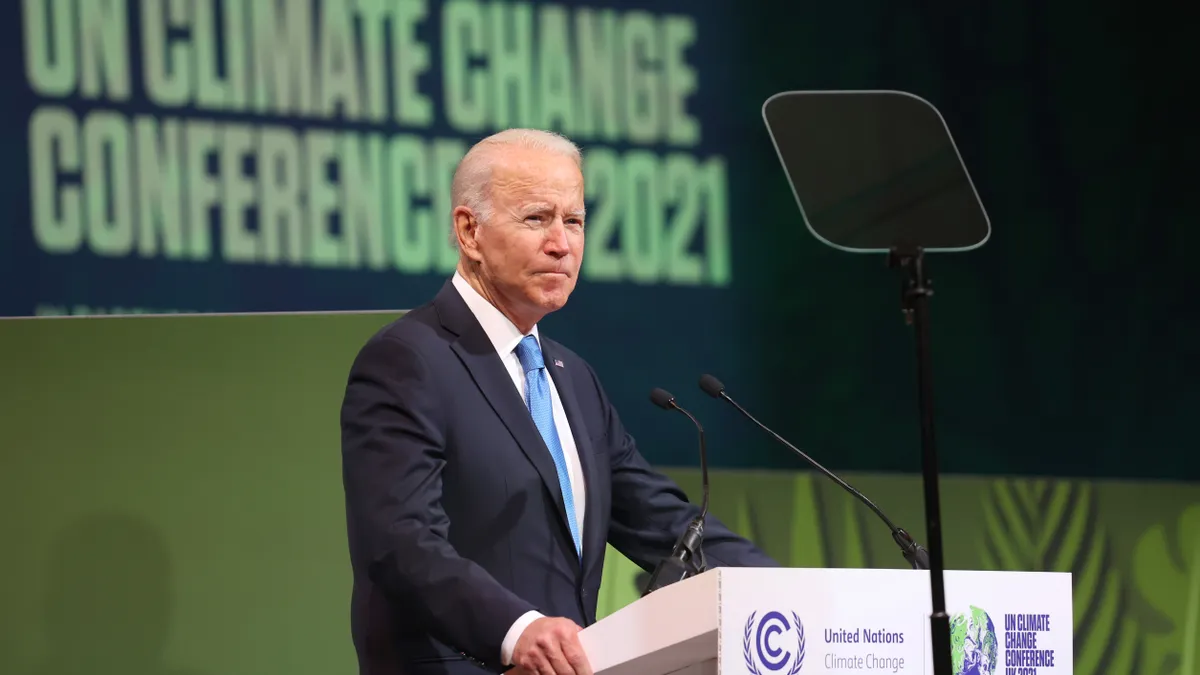Dive Brief:
- President Joe Biden on Monday apologized for the United States' withdrawal from the Paris climate accord, and acknowledged "every day we delay, the cost of inaction increases." He was addressing world leaders at the 2021 United Nations Climate Change Conference (COP26) in Glasgow, Scotland.
- Biden recommitted the nation to the Paris accord on his first day in office, as the United States withdrew from the global environmental compact under former President Donald Trump. The Biden administration issued a long-term plan on Monday to decarbonize the U.S. economy by 2050.
- The plan asks the electric sector to eliminate emissions by 2035 through transmission upgrades, energy efficiency, storage and non-emitting generation. Several other strategies will be required, including carbon capture at power plants and technology to remove CO2 from the atmosphere.
Dive Insight:
Biden apologized in Glasgow, and told world leaders that "the American people, four or five years ago, weren't at all sure about climate change, whether it was real."
"I guess I shouldn't apologize, but I do apologize," Biden said.
Experts say limiting global warming to 1.5 degrees Celsius above pre-industrial levels is necessary to mitigate the worst impacts of climate change. Biden said the United States now understands the challenge ahead and can help to meet that goal.
"We're planning for both a short term sprint to 2030 that will keep 1.5 degrees Celsius within reach, and for a marathon that will take us to the finish line and transform the largest economy in the world into a thriving innovative, equitable and just clean energy engine," he said.
The long-term decarbonization plan issued by the White House will lean on five strategies, including decarbonizing the electric sector by 2035, boosting efficiency, and the electrification of buildings and transportation. Other approaches include reduced methane emissions through leak detection and repairing oil and gas systems, and scaling up technologies to remove carbon from the atmosphere.
The Biden administration has set a target to reduce economy-wide greenhouse gas emissions by 50-52% by 2030, and officials say the new strategy can achieve that goal. The plan, however, depends on the passage of Biden's agenda by a divided Congress.
On Thursday, the White House and Democrats appeared to reach agreement on a $1.85 trillion budget framework, which includes $550 billion for clean energy and climate programs over the next decade. It is not clear, however, whether Sen. Joe Manchin, D-W.Va., supports the plan and Democrats cannot afford to lose any votes in the Senate.
The infrastructure deal and Build Back Better framework will "put us on a decisive path to achieve our climate goals," U.S. National Climate Advisor Gina McCarthy said in a call with reporters on Monday.
"We have and will continue to use every agency and every tool at our disposal to marshal a climate response that isn't about sacrifice, it's about opportunity and possibility," McCarthy said.
Increasingly, the world is focused on maintaining the 1.5 degree cap on temperature rise, according to Special Climate Envoy John Kerry. About 65% of the global gross domestic product is now committed to that goal, he said during the press call with McCarthy.
"When I came into the job in January, and we began our outreach to countries, there were only two or three entities — very few — who were on a track to try to hold 1.5 degrees. Now we have half of — more than half of the G20 and countries around the world that have come to the table in increasing their ambition," Kerry said.
There is some doubt as to whether holding the 1.5 degree line is possible, however. According to the United Nations' Intergovernmental Panel on Climate Change, most scenarios see the world breaching that limit sometime in the 2030s.
"The actions that leaders take this decade will be pivotal in determining whether we have a chance of holding temperature rise to less than 1.5° Celsius," Jake Schmidt, senior strategic director for Natural Resources Defense Council's international climate program, wrote in a Monday blog.
Currently, the world is heading for a 2.8-2.9 degree Celsius change, Schmidt wrote, but "countries have announced additional targets, which should be followed with stronger actions in the coming years."
For the U.S., Biden's plan includes a whole-of-government initiative that will accelerate financing for climate change mitigation through "multilateral and bilateral adaptation funds" and the development of "bankable investments" to mobilize private capital. The goal is to mobilize $100 billion annually for climate finance, Biden told world leaders.
The administration has also committed to helping vulnerable communities and other countries plan for climate impacts. The U.S. has "an obligation to help," said Biden.
"We want to do more to help countries around the world, especially developing countries, accelerate their clean-energy transition, address pollution, and ensure the world we all must share a cleaner, safer, healthiest planet," he said.














